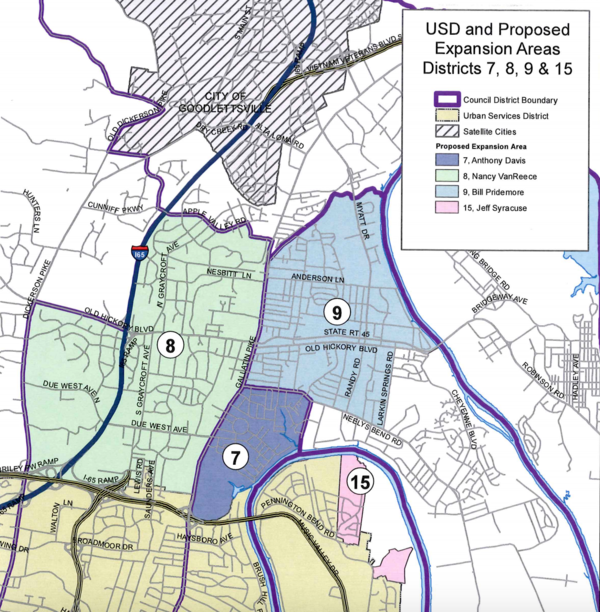
The humble garbage collector has an ardent fan base in Madison. And supporters like Angela Yates showed up in force this week to say so to the Metro Council.
“We have the best trash man in Nashville,” she said. “I’ve seen him trudge up hills in ice and snow to take his trashcans to his elderly clients. I’ve seen him risk life and limb.”
“And every time, I’ve never heard that man grumble.”
Yates came to the defense of J.E. McMurtry Disposal, a family-run enterprise that finds itself at the center of a testy debate. The hauling company has been
a fixture for 58 years in the parts of Davidson County where private companies still handle the trash.
At issue now is whether Metro will
expand its Urban Services District and take over that duty, potentially displacing the business.
“It is despicable,” Yates said.
The change would mean that residents go from paying direct fees to companies like McMurtry, to paying higher taxes — with Metro picking the contractor through a competitive bid process that some say is beyond the reach of current operators.
Joe Willis, a farmer, said he trusts the McMurtrys.
“They are loyal. They are dependable,” he said. “They do everything that a small business owner can do to try to keep their customers happy.”
https://youtu.be/NXDkZ7tDa1w?t=51m19s
This desire to protect local operators led large parts of Nashville to reject the Urban Services District. The proposal initially aimed to add 73,000 homes, but many neighborhoods have backed away.
In fact, by the end of Tuesday’s meeting, the council moved to exclude the area where several opponents reside.
The rural enclave of Neelys Bend — near Madison, and served by McMurtry Disposal — is no longer in consideration for the urban district.
Still, much of Madison is on track to be added.

Councilwoman Nancy VanReece, who represents the area, said she gave the McMurtry company early notice of the possible change and hopes they’ll bid for a Metro contract.
“We wanted to give them every chance to decide what their impact was going to be and to prepare for it,” she said.
Whether the company will do that is uncertain.
Roger McMurtry described several hurdles. First, he contends that another Metro contractor is already entitled to new areas of service (a point that Metro Public Works contests).
If a bid process is opened, he isn’t sure if McMurtry Disposal could be competitive. He said that’s because Metro has identified Madison for a particular type of trash collection dependent on trucks with mechanical arms. He said a fleet of three could cost nearly $1 million.
“My uncle has grown the business for 58 years and has fought against the bigger companies trying to come in and take his customers,” Roger McMurtry said. “To basically lose half of your customers — and you, the business, to not be the cause of it — is a tough loss.”
VanReece, the councilwoman, argues that the overall perks of the urban district, like sidewalk funding, will help — not hurt — an array of small businesses.
“We have a situation where we’re actually going to be able to prepare for more businesses coming into the area. And when businesses come, they’ll be required to put a sidewalk,” she said. “Businesses … they want to know there’s police and fire and trash disposal.”


